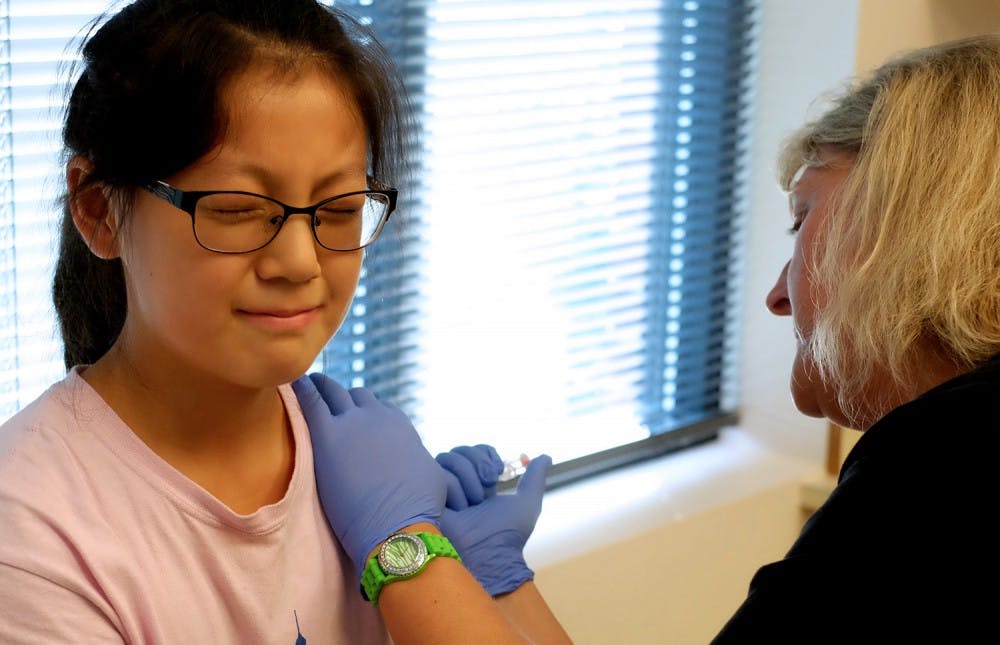According to the North Carolina Department of Health and Human Services, the state’s exemption rate has been creeping up for the past decade. The proportion of children vaccinated fell to 98.91 percent in 2013 from 99.68 percent in 2003, inciting concerns about the danger of highly infectious diseases making a comeback.
Despite the vocal opposition, North Carolina is actually doing well in vaccination coverage — it ranked 20th nationally in 2013, according to the state health department.
But Orange County has the ninth-lowest vaccination rate of the 100 counties in North Carolina.
North Carolina had the third-highest number of cases of measles in 2013, when a visitor from India spread the disease in a religious community in Stokes County — an area with low vaccination rates. Whooping cough, characterized by violent coughing fits, has been on the rise in the state, with the number of cases tripling to 782 by the end of 2014, from 206 in 2011.
California led the conversation this summer when the state legislature scrapped its personal-belief exemptions after a 2014 measles outbreak in Disneyland. A total of 111 people at the park were infected with measles, a disease that can lead to brain swelling, pneumonia and death. Measles was declared eliminated from the U.S. in 2000.
A group of North Carolina senators sponsored a bill in March that aimed to repeal religious exemptions. Unlike in California, the bill died when it met opposition.
“The problem I face is that leadership has taken the whole subject of vaccination off the table,” said state Sen. Terry Van Duyn, D-Buncombe, one of the bill’s main sponsors. “I would have preferred that we got expert testimony about the necessity and schedule of vaccination.”
Buncombe County consistently has one of the lowest coverage rates in North Carolina. In the past decade, the county was one of eight that had a measles outbreak and also had the sixth-highest average number of whooping cough cases.
Parents decide to opt out of vaccinations for many reasons. Some worry that vaccines cause autism; some are concerned about mercury content in vaccines; some fear adverse reactions; and some just don’t want their rights restricted.
The BMJ, an international, peer-reviewed medical journal, has debunked vaccine-autism results as false, citing tiny sample size and the inability to reproduce results. Dr. Tom Belhorn, a physician and associate professor of pediatrics at UNC, said autism develops about the same time most children get vaccines, leading some to mistakenly attribute autism to vaccines.
According to the Food and Drug Administration, vaccines no longer contain mercury. A World Health Organization fact sheet states that vaccine reactions are “minor and temporary” and it is more likely for a person to be injured by the disease than by the vaccine.
Belhorn said it’s hard for people to see the need for vaccines when they don’t see the diseases.
To get the day's news and headlines in your inbox each morning, sign up for our email newsletters.
“I’ve unfortunately had babies die on me of pertussis, and I’ve treated measles, and people here rarely see diphtheria,” Belhorn said.
He said the key to vaccination is that it provides “herd immunity” to the community.
“Some people think we don’t see this in the United States anymore, so we really don’t need to be getting this, but they are relying on the immunity of others,” he said.
Dr. Rula Mouawad, physician and founder of Integrative Medical Eco Village in Chapel Hill, was concerned when she found out about the low vaccination rates in her children’s Orange County school.
“I initiated several lectures when pertussis happened, and I talked to (parents) about pros and cons of getting injection,” she said. “When you look at the internet, you have to be wary of what you are reading.”
But she doesn’t support Van Duyn’s bill. She believes parents should be allowed to make educated decisions instead of forcing them to vaccinate.
A subset of parents also worry that inundating their child with jabs is detrimental to their bodies. Babies younger than 10 months old are receive about 13 shots over seven months. Out of concern, many parents choose to vaccinate their children on a delayed schedule — Mouawad is one of them.
Their decision poses an accounting problem to the state.
Adrianne Anderson, an administrative assistant at a private school in Buncombe County, said the school she works at has a less-than-60 percent coverage rate. Most children in the school were vaccinated on a delayed schedule.
“We’re legally not allowed to have an incomplete (immunization) schedule on file, and the easiest thing for them is to not have any immunizations on file and just file a religious exemptions form,” she said.
The World Health Organization states on its website that the vaccination schedule does not pose a risk to children and that children are more likely to complete their vaccinations if they follow the conventional schedule.
Most anti-vaccine parents are not advocating for the eradication of vaccines. Lisa Jillani, founder of the vaccine-skeptical nonprofit People Advocating Vaccine Education, said those parents do more research about vaccinations than other parents.
“It just amazes me that parents don’t put any thought whatsoever about vaccinations, because how do they know what’s in the vaccine?” Jillani said.
Orange County Health Department spokeswoman Stacy Shelp said she encourages people to be vaccinated.
“You do have some kids who are not vaccinated in the school, and that doesn’t only put them in harm’s way,” she said. “It can put other kids in harm’s way.”
@Zhainatyun
special.projects@dailytarheel.com




